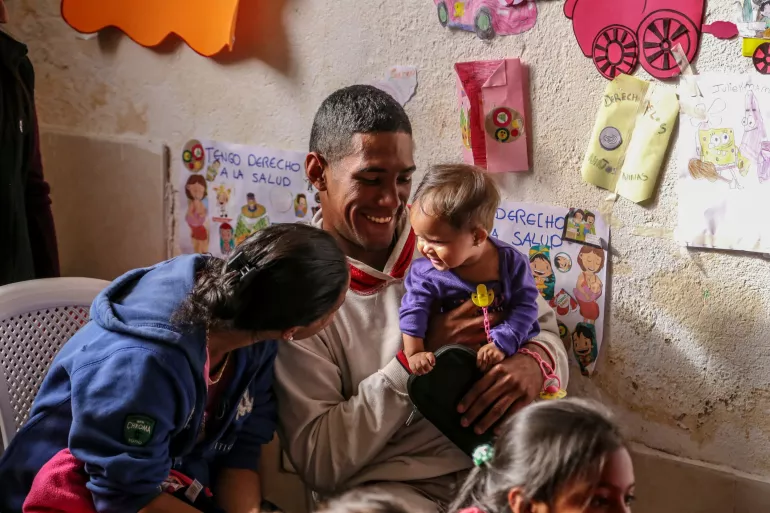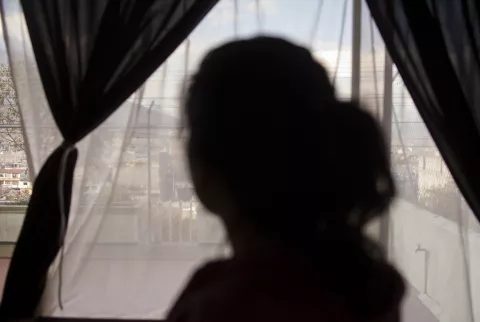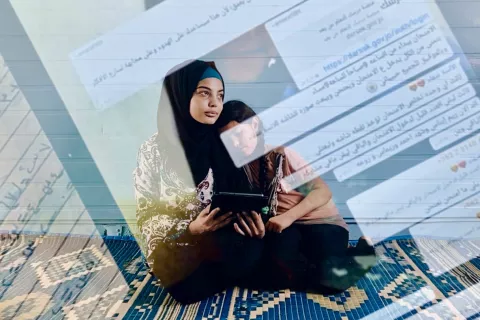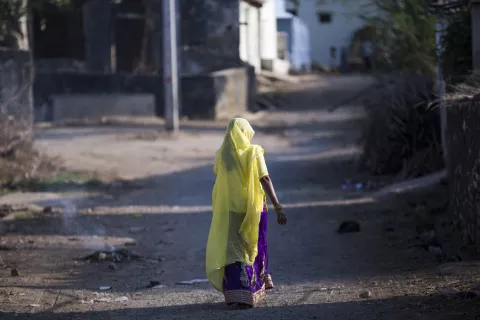When the COVID-19 virus began spreading in the spring of 2020, it hit Jessica Yanina Aveldano, a 30-year-old single mother in Argentina, especially hard.
“I have multiple jobs because with one, the income isn’t enough,” Aveldano explained. “On weekends I have to do a double shift at a bakery and my children have to come with me to work all day. I really try, so my children don’t lack anything.”
The long hours inevitably took a toll. “I push myself too hard,” Aveldano admits. “A couple of months ago my doctor said I had a stress attack.”
In Argentina, Jessica Yanina Aveldano’s story is not unique. The pandemic has had a debilitating effect on how women work and care for their children. For many, the double burden and the isolation had a negative effect on their well-being, including effects on their mental health. It highlighted a care crisis that was already there but hidden. We measured this in a survey showing that 57 per cent of women with children felt overburden during the pandemic”
During the pandemic, the number of children living under the poverty line increased to 6 out of 10
The pandemic has had an enormous impact on the Argentine economy. As the GDP fell by 9.9 per cent of its pre-COVID value, the number of children living under the poverty line increased to 6 out of 10. Women like Jessica who work in the informal economy make up more than 38 per cent of female wage earners in Argentina. They are especially vulnerable because they lack protection from labour laws like unemployment benefits, family leave or sick leave: only 50 per cent of parents (with formal jobs) have access to maternity or paternity leave.
The Universal Child Benefit (Asignación Universal por Hijo-AUH), the most relevant child-oriented social protection policy in Argentina, is aimed at equalizing the rights to social protection of these children with those of formal workers. It targets children whose parents are unemployed, work in the informal sector, are domestic workers or self-employed with low incomes. However, challenges to inclusion and coverage remain, resulting in over one million children without any kind of coverage. Also, only 21 per cent of children under the age of 3 have access to child-care services.
As the pandemic worsened, and economic activities were restricted, the rate of women’s economic participation dropped by 8.2 percentage points; 14 percentage points in the case of female single-headed households. This forced more than one and-a-half million women out of the job market.
The diamond model
At UNICEF Argentina, we have been working to close the gap in access to family-friendly policies (FFPs), using strategies at both the macro and micro level. To do this, we are guided by the “diamond model” approach (Razavi, 2007), which considers the roles and responsibilities of key stakeholders on care: government, the private sector, civil society, and families themselves. Jointly with Equipo Latinoamericano de Justicia y Género, a civil society organisation, we have generated evidence and advocated to change family leave legislation (not modified in over 40 years), from both a childhood and gender perspective.
The diamond model is a strong example of how imperative it is to work with multiple stakeholders to achieve maximum results at a public policy level, including engaging families and communities to demand for better FFPs. If you want to change a law and deep-rooted social norms, you must work with the public and private sector, the community and families. That’s what brings results.
Working with stakeholders
At the private sector level, we started the “Empresas Que Cuidan” (Companies that Care) initiative that gathers more than 30 companies to work on evidence, capacity building, advocacy and tools like a digital platform for businesses for self-assessment of their progress. At the core was a re-thinking how to keep childcare and FFPs in the policy agenda.
Building alliances was extremely important, both within UNICEF (Social Inclusion, Business for Results and Communications working closely) and with different key stakeholders. In 2020 we started working with trade unions: we developed guideline and workshops with them to strengthen their role in promoting care policies in collective bargaining discussions. The main goal in supporting workers in the informal economy is to empower women unionists because they lead this agenda.
Family-friendly policies
This strategy was echoed by Rachel Moussié from WIEGO – Women in Informal Employment Globalizing and Organizing – who partnered with UNICEF and ILO on a recent policy brief, Family-friendly policies for workers in the informal economy. “Women everywhere have been hit hard by the pandemic, and there’s a real lack of childcare,” Moussié says. “The result is catastrophic for women and their children.” She believes solutions lie in underscoring “a real need for public investment to provide childcare where informal workers live and work.”
As Chemba Raghavan, UNICEF Early Childhood Development Specialist says, “Providing a package of family-friendly policies including access to affordable, accessible quality childcare for all workers promotes children’s development and wellbeing. It is good for children, women, families and economies.”
I hope our work in the UNICEF Argentina’s post-pandemic model will inspire other organizations to care about those who provide ‘care’.
Carolina Aulicino is a Social Policy Officer, UNICEF Argentina.




